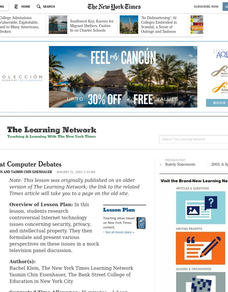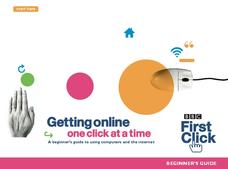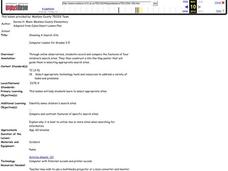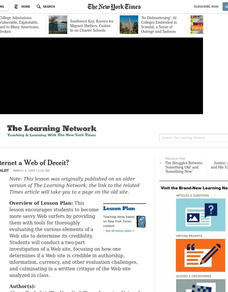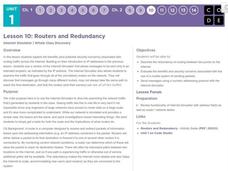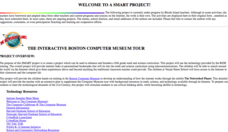Curated OER
Arctic Writing
Fifth graders analyze photographs in order to write descriptively. In this descriptive writing lesson plan, 5th graders use the Internet to research and view photographs of the arctic. Students use descriptive language to...
Curated OER
All About Our Town
Pupils explore brochure writing. They work in groups to brainstorm and categorize important places in their community. In addition, they gather information from the Internet, take pictures using a digital camera, and create a community...
Curated OER
The Great Computer Debates
Students research controversial Internet technology issues concerning security, privacy, and intellectual property. They formulate and present various perspectives on these issues in a mock television panel discussion.
Curated OER
Internet Measurement
Students become familiar with how to get information from the Internet. In this math and technology lesson plan, students measure objects on a measurement sheet found on a web site. They practice using a standard unit of measurement...
Google
Be Internet Awesome
Teach the qualities of a digitally smart citizen with a set of lesson plans created by Google. Along with creating strong passwords, learners explore how to protect their privacy, when to stand up for others against cyberbullying,...
BBC
Getting Online One Click at a Time
The Internet is a vast and fascinating place to be, but you have to know how to get there first! Use a helpful guide to become computer savvy in no time. It covers computer basics such as keyboarding and hardware, and goes into e-mail,...
Beauty and Joy of Computing
Search Engines
Which search engine is best? The last lab in a unit of five leads the class to investigate search engines. Working in groups, individuals read and discuss articles related to searching the Internet. Pupils develop suggestions that...
Curated OER
Intelligence in the Internet Age
Does technology affect our intelligence? Stefanie Olsen's article, "Intelligence in the Internet Age," and the thought provoking reading comprehension questions that follow, are sure to generate a lively discussion.
Curated OER
Choosing A Search Site
Computer savvy kids construct a lift-the-flap poster to aid them in selecting appropriate search sites for research and information gathering. Through online observations, they record and compare the features of four children's search...
Curated OER
All About Computers
Students discover facts about computers. In this technology lesson, students find out how to locate information on the Internet. Students choose a topic to research and search several sites for information.
Curated OER
Internet Stuff Puzzle
In this Internet word search puzzle, students identify terms relating to the Internet and technology. They locate terms such as URL, threads, provider, world wide web and modem. A list of approximately 60 words is provided to assist...
Curated OER
Know Your Computer Hardware #103
Students discover the different terms and parts of a computer's body. For this computer basics lesson, students become familiar with the parts of the computer, starting in kindergarten and increasing their knowledge through...
Curated OER
Is the Internet A Web Of Deceit?
Students become more savvy Web surfers by evaluating the various elements of a Web site to determine its credibility. They conduct a two-part investigation of a Web site, focusing on how one determines if a Web site is credible in...
Curated OER
Geography, Map Skills & the Internet:
Students research various websites focusing on Italy while enhancing student utilization of computer, keyboards and the Internet. They discuss their findings on the geography, history, topography, and culture.
Curated OER
Career Connections
Students discover ways to use the Internet. In this Internet lesson, students complete an online tutorial and find ways to use toolbars and navigate using a browser. Students conduct an online scavenger hunt and find ways to...
Code.org
Routers and Redundancy
How are messages to the right recipient? Introduce the concept of routing Internet traffic by drawing a comparison to sending a letter. Groups use the Internet Simulator program to send messages to others using the same router...
Facebook
Public Wi-Fi
Sometimes free Wi-Fi comes with a hefty price tag! Networking novices examine the components of a Wi-Fi network during a digital citizenship lesson from an extensive series. Groups work together to map out a day's worth of Internet...
Me and My Shadow
Trace My Shadow
Which creates more digital traces: surfing the Internet in a coffee shop, or using an iPhone to send a text message? The answer may surprise you! An interactive resource prompts users to choose which devices, operating systems, and...
Concord Consortium
Vending Machine
Let the resource quench your thirst for knowledge, like a vending machine that dispenses drinks. Future computer scientists develop an algorithm to identify the fewest number of coins that a vending machine could use in creating change....
Curated OER
Web Training: Do You Know How to Use the Internet?
Students discover how to use the Internet for research. In this technology lesson, students access and use the World Wide Web to research. Students are encouraged to critically consider information they find on the Internet.
Curated OER
From the Beginning of Time, Online: Using the Internet to Explore History
Students use the Internet to research historical events. They compare and contrast different websites to find the best information. They write summaries based on the information they found and give presentations.
Curated OER
Searching the Internet Beginners
Young scholars explore how to research on the Internet. In this Internet research lesson plan, students research the Internet directories and answer questions about using Google. Young scholars complete an evaluation sheet of the activity.
Curated OER
The History Of The Internet
Learners explain how the Internet evolved and what it is today.
University of Rhode Island
The Interactive Boston Computer Museum Tour
Fifth graders use the Internet to use an interactive program which helps them explain the Internet better. They take a tour of a computer museum and focus on how the Internet works through an exhibit.




